Game Review: Zelda II: the Adventure of Link
The Legend of Zelda was a staple game of my childhood, and I eventually managed to conquer the entire game without resorting to more help than we were expected to get in those days. Friends on the playground, questions to the counselors in Nintendo Power, and the dogged persistence of a kid who has an enormous amount of free time and a finite amount of ways to spend it. Particular circumstances that have almost vanished, now that a simple internet connection provides everyone who has one with more entertainment than they could ever watch even if they spent a thousand lifetimes on it.
Do you remember those long summer days, when you had no more media to watch because you had consumed everything available to you? Because kids today don't. They don't know what that's like.
Anyway, I rented Zelda II because I liked The Legend of Zelda and it was the sequel, right? It had to be good. Little did I know that it was very different from its predecessor and mostly in ways I didn't appreciate. Towns? An overworld with random encounters? Experience points? Maybe Nintendo was building off the obvious success of Dragon Quest, but I didn't know that. And neither did other Americans, because we didn't get Dragon Quest until two years after Zelda II hit North America and three years after it first came out in Japan. I flailed around for a while without much idea of what to do, never accomplished anything, and then didn't bother renting it again. And never even played it again, until now.
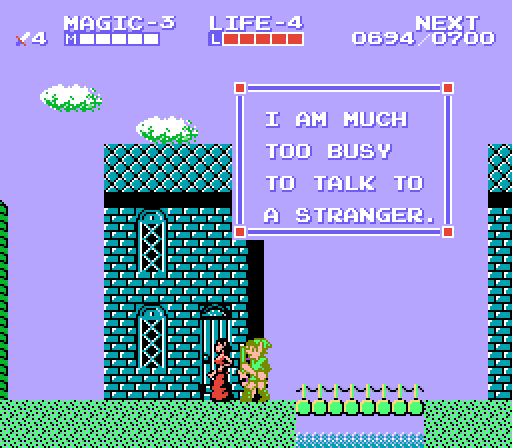
Well excuuuuuuuuuuse me, princess!
One of the ancient debates among the luderati is whether the Zelda games are RPGs. It has character progression and an expansion of your moveset through unlocking new capabilities, but so does Super Metroid. It has gaining progressively more powerful weapons and armor, but so does Gradius. And some of this is down to RPG in video-game terms not really having a set definition and mostly coming down to individual idiosyncrasies and feeling. Like, is Call of Duty an RPG? It has levels and XP and perks you can buy, just like Fallout! But most people would say it is not, just like most people would say that Wizardry is an RPG even though you aren't "playing a role" in any meaningful sense and there's no interaction with anything beyond stabbing it in the face.
That said, Zelda II comes down much closer to the RPG end of the spectrum than any other game in the series. It has levels and experience points, and even requires some grinding in the old-school RPG tradition. It has towns full of townspeople who offer very perfunctory conversation and dispense quests. It has spells Link can learn and cast in battle. It has secret martial techniques taught by ancient warrior-sages, like the ability for Link to hold his sword above his head. It even has the tools found in other Zelda games, though not very many and they don't see much active use.
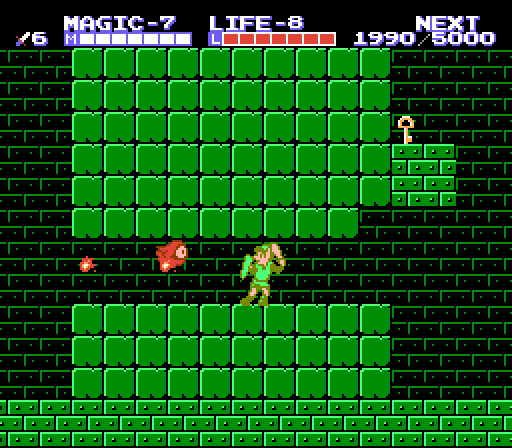
Let the grinding continue.
The problem with Zelda II is that this is mostly unnecessary. There's leveling and experience, but each upgrade costs a set amount of experience in a ladder, and while you can skip upgrades and come back to them later, it's generally a good idea to go in the order the game suggests. Especially in the Japanese version, where dying resets your stats down to the level of whatever the lowest stat is. Fortunately they removed that from the American version. There are already health and mana upgrades in the game, and if the designers had just scattered a few more and added sword levelups as well to increase attack rate, the whole RPG system wouldn't be necessary. Then there wouldn't be any grinding, either, which is all to the good.
The grinding is probably one of the worst things about Zelda II. Killing the same enemies over and over is only ever so fun, and here where combat is a bit finicky and always dangerous, it's much less so. And Heaven forbid you lose all your lives, which take all your experience with them. I got around this by abusing save-states to a level I've never done before in any NES game, but it was the main reason I gave up the first time I played the game. Starting off, Link is very weak and the best thing to do is to grind for a while. But unlike Final Fantasy, where I ground for hours before tackling the Marsh Cave or the Lefeinian Space StationSky Fortress, I didn't find grinding in Zelda II to have even the minimal level of fun necessary for me to enjoy it. The controls are imprecise enough and Link's sword is small enough that fighting anything when I had less than full health was annoying at best and infuriating at worst.
Fortunately, though, abuse of save states meant I didn't have to spend more than a couple hours or so doing it over the course of the game. Over the course of the eight hours I played.
Oh.
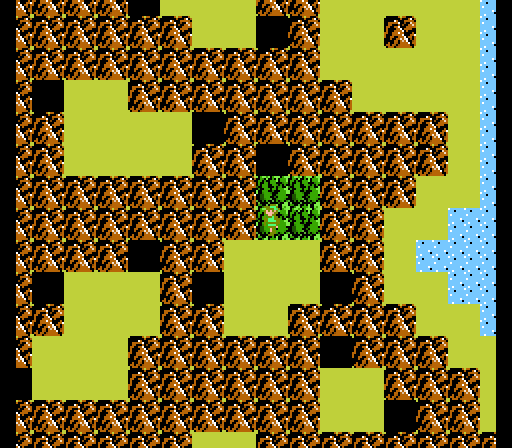
Death Mountain earns its name.
The grinding ties into the difficulty curve, which is stacked against you right at the start. Going through Death Mountain would be an excruciated experience if I just did the minimum necessary to get through the first palace and then went straight there, and an even worse experience if I had missed the Life spell, found by giving a woman her lost mirror found by searching a table in an otherwise empty house. By the time I finished the second temple, my level was 5-5-6, which was high enough that I was able to stay ahead of the curve. But that only happened because of the aforementioned grinding.
I even ended up grinding in the first temple because temple rewards are terribly designed. See, finishing a temple gives Link enough experience to hit the next level, regardless of how much XP that is. So I finished the temple, got the 6 XP to the next level, stared at the screen, and reloaded my savestate to go grind slimes back a few screens for roughly fifteen seconds. Net result: +800 XP.

This is terrible design. It's like Oblivion without mods where quest rewards scale to your level at the time you do the quest, so the best solution is grind for hours doing random activities until you're in the highest possible level bracket and can get the best rewards. The best solution in Zelda II is probably to go grind for a while until you need thousands of XP to get the next level in order to maximize the benefit from temple rewards and cut total grinding time to the minimum. But not zero. You're grinding no matter what.
Having an experience system in a Zelda game isn't an innately bad decision, but they made just about every bad decision they could for how to implement it.
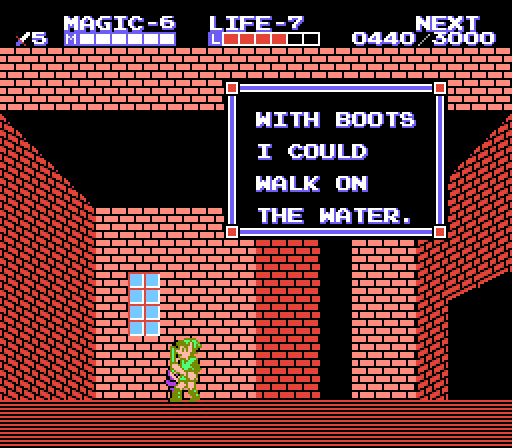
I'm obviously buying the wrong boots.
I did like the talking aspect, though. It's a different type of experience than The Legend of Zelda, where Link is alone in a vast wilderness with only a few scattered survivors of Ganon's reign of terror hiding in caves or secret boltholes concealed in the brush. Zelda II has towns with a variety of townspeople, maybe a dozen separate sprites, but that's still enough to throw in random townspeople going about their business to make towns feel alive.
And I liked how when you go to Hyrule, there are no towns there. Obviously Ganon's depredations destroyed civilization in that part of the world.
The conversations are pretty perfunctory, but it's obviously memory limitations. The dialogue box is small and so speech is mostly stilted and confusing to accommodate those limitations. It's not like Simon's Quest, where for years we in the west thought that the translation had been botched until interviews with the designers told us that the townspeople deliberately lied to Simon. Everyone makes fun of "I am Error" because it sounds silly and might have been a bit more clear if they translated オレノナハエラーダ more directly as "My name is Error," but when you run into someone later who tells you to talk to Error, it's obvious what to do. There's no whirlwinds and digging graves and other nonsense you have to sort through to find the truth.
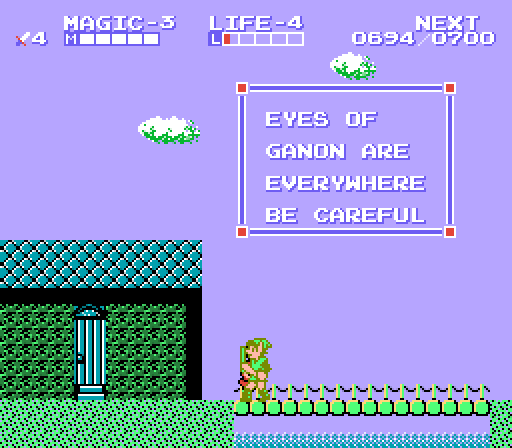
Paranoia!
This all combined with me having the most fun wandering around the world map and chatting to people in towns and the least fun delving into the maze-like temples. The temples consisted of getting lost, going up and down elevators, grinding respawning enemies for magic drops so I could cast Life and refill my health bar, fighting enemies that seemed to have patterns deliberately designed to infuriate me--Iron Knuckles were incredibly frustrating until I remembered the jump-and-stab-in-head strategy--and of course, constantly looking at my experience total and trying to manage when I beat the temple so that I could get the greatest benefit from it.
Despite that, I don't think Zelda II is a bad game, just a rough one. After all, A Link to the Past has a lot of the same aspects of Zelda II on a slightly smaller scale--one town, less distance to travel, etc.--but refined in a way that's a lot more fun to me. And the side-scrolling combat could be fixed by making Link's sword longer. Everything else works fine.
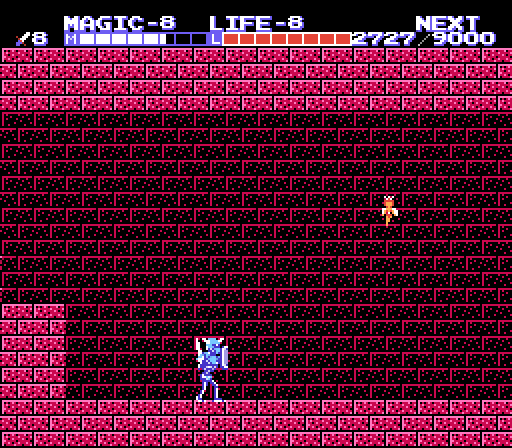
Peace out.
In the end, I'm glad I played it. Now that Nintendo is working on Breath of the Wild, which seems to be the final culmination of all the ideas that were put foward in The Legend of Zelda and Zelda II but which the Famicom did not have the technology to support, I wanted to play the games through in order until I got sick of it or until the NX comes out. There's some bad in here, but mostly it's just ideas straining against hardware limitations with occasional moments of something really great coming through. I mean, I put a lot of effort into modding random townspeople into the Bethesda RPGs I play now and here they are in an NES game like it was just ordinary.
Do you remember those long summer days, when you had no more media to watch because you had consumed everything available to you? Because kids today don't. They don't know what that's like.
Anyway, I rented Zelda II because I liked The Legend of Zelda and it was the sequel, right? It had to be good. Little did I know that it was very different from its predecessor and mostly in ways I didn't appreciate. Towns? An overworld with random encounters? Experience points? Maybe Nintendo was building off the obvious success of Dragon Quest, but I didn't know that. And neither did other Americans, because we didn't get Dragon Quest until two years after Zelda II hit North America and three years after it first came out in Japan. I flailed around for a while without much idea of what to do, never accomplished anything, and then didn't bother renting it again. And never even played it again, until now.

Well excuuuuuuuuuuse me, princess!

One of the ancient debates among the luderati is whether the Zelda games are RPGs. It has character progression and an expansion of your moveset through unlocking new capabilities, but so does Super Metroid. It has gaining progressively more powerful weapons and armor, but so does Gradius. And some of this is down to RPG in video-game terms not really having a set definition and mostly coming down to individual idiosyncrasies and feeling. Like, is Call of Duty an RPG? It has levels and XP and perks you can buy, just like Fallout! But most people would say it is not, just like most people would say that Wizardry is an RPG even though you aren't "playing a role" in any meaningful sense and there's no interaction with anything beyond stabbing it in the face.
That said, Zelda II comes down much closer to the RPG end of the spectrum than any other game in the series. It has levels and experience points, and even requires some grinding in the old-school RPG tradition. It has towns full of townspeople who offer very perfunctory conversation and dispense quests. It has spells Link can learn and cast in battle. It has secret martial techniques taught by ancient warrior-sages, like the ability for Link to hold his sword above his head. It even has the tools found in other Zelda games, though not very many and they don't see much active use.

Let the grinding continue.
The problem with Zelda II is that this is mostly unnecessary. There's leveling and experience, but each upgrade costs a set amount of experience in a ladder, and while you can skip upgrades and come back to them later, it's generally a good idea to go in the order the game suggests. Especially in the Japanese version, where dying resets your stats down to the level of whatever the lowest stat is. Fortunately they removed that from the American version. There are already health and mana upgrades in the game, and if the designers had just scattered a few more and added sword levelups as well to increase attack rate, the whole RPG system wouldn't be necessary. Then there wouldn't be any grinding, either, which is all to the good.
The grinding is probably one of the worst things about Zelda II. Killing the same enemies over and over is only ever so fun, and here where combat is a bit finicky and always dangerous, it's much less so. And Heaven forbid you lose all your lives, which take all your experience with them. I got around this by abusing save-states to a level I've never done before in any NES game, but it was the main reason I gave up the first time I played the game. Starting off, Link is very weak and the best thing to do is to grind for a while. But unlike Final Fantasy, where I ground for hours before tackling the Marsh Cave or the Lefeinian Space StationSky Fortress, I didn't find grinding in Zelda II to have even the minimal level of fun necessary for me to enjoy it. The controls are imprecise enough and Link's sword is small enough that fighting anything when I had less than full health was annoying at best and infuriating at worst.
Fortunately, though, abuse of save states meant I didn't have to spend more than a couple hours or so doing it over the course of the game. Over the course of the eight hours I played.
Oh.


Death Mountain earns its name.
The grinding ties into the difficulty curve, which is stacked against you right at the start. Going through Death Mountain would be an excruciated experience if I just did the minimum necessary to get through the first palace and then went straight there, and an even worse experience if I had missed the Life spell, found by giving a woman her lost mirror found by searching a table in an otherwise empty house. By the time I finished the second temple, my level was 5-5-6, which was high enough that I was able to stay ahead of the curve. But that only happened because of the aforementioned grinding.
I even ended up grinding in the first temple because temple rewards are terribly designed. See, finishing a temple gives Link enough experience to hit the next level, regardless of how much XP that is. So I finished the temple, got the 6 XP to the next level, stared at the screen, and reloaded my savestate to go grind slimes back a few screens for roughly fifteen seconds. Net result: +800 XP.


This is terrible design. It's like Oblivion without mods where quest rewards scale to your level at the time you do the quest, so the best solution is grind for hours doing random activities until you're in the highest possible level bracket and can get the best rewards. The best solution in Zelda II is probably to go grind for a while until you need thousands of XP to get the next level in order to maximize the benefit from temple rewards and cut total grinding time to the minimum. But not zero. You're grinding no matter what.
Having an experience system in a Zelda game isn't an innately bad decision, but they made just about every bad decision they could for how to implement it.

I'm obviously buying the wrong boots.
I did like the talking aspect, though. It's a different type of experience than The Legend of Zelda, where Link is alone in a vast wilderness with only a few scattered survivors of Ganon's reign of terror hiding in caves or secret boltholes concealed in the brush. Zelda II has towns with a variety of townspeople, maybe a dozen separate sprites, but that's still enough to throw in random townspeople going about their business to make towns feel alive.
And I liked how when you go to Hyrule, there are no towns there. Obviously Ganon's depredations destroyed civilization in that part of the world.

The conversations are pretty perfunctory, but it's obviously memory limitations. The dialogue box is small and so speech is mostly stilted and confusing to accommodate those limitations. It's not like Simon's Quest, where for years we in the west thought that the translation had been botched until interviews with the designers told us that the townspeople deliberately lied to Simon. Everyone makes fun of "I am Error" because it sounds silly and might have been a bit more clear if they translated オレノナハエラーダ more directly as "My name is Error," but when you run into someone later who tells you to talk to Error, it's obvious what to do. There's no whirlwinds and digging graves and other nonsense you have to sort through to find the truth.

Paranoia!

This all combined with me having the most fun wandering around the world map and chatting to people in towns and the least fun delving into the maze-like temples. The temples consisted of getting lost, going up and down elevators, grinding respawning enemies for magic drops so I could cast Life and refill my health bar, fighting enemies that seemed to have patterns deliberately designed to infuriate me--Iron Knuckles were incredibly frustrating until I remembered the jump-and-stab-in-head strategy--and of course, constantly looking at my experience total and trying to manage when I beat the temple so that I could get the greatest benefit from it.
Despite that, I don't think Zelda II is a bad game, just a rough one. After all, A Link to the Past has a lot of the same aspects of Zelda II on a slightly smaller scale--one town, less distance to travel, etc.--but refined in a way that's a lot more fun to me. And the side-scrolling combat could be fixed by making Link's sword longer. Everything else works fine.

Peace out.
In the end, I'm glad I played it. Now that Nintendo is working on Breath of the Wild, which seems to be the final culmination of all the ideas that were put foward in The Legend of Zelda and Zelda II but which the Famicom did not have the technology to support, I wanted to play the games through in order until I got sick of it or until the NX comes out. There's some bad in here, but mostly it's just ideas straining against hardware limitations with occasional moments of something really great coming through. I mean, I put a lot of effort into modding random townspeople into the Bethesda RPGs I play now and here they are in an NES game like it was just ordinary.